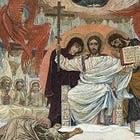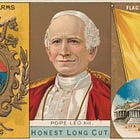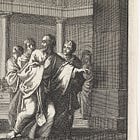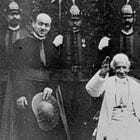St Thomas Becket died for the liberty of the Church—not for religious liberty
It is impossible to defend the liberty of the Church and the Kingship of Christ whilst simultaneously holding to the modern conception of religious liberty.
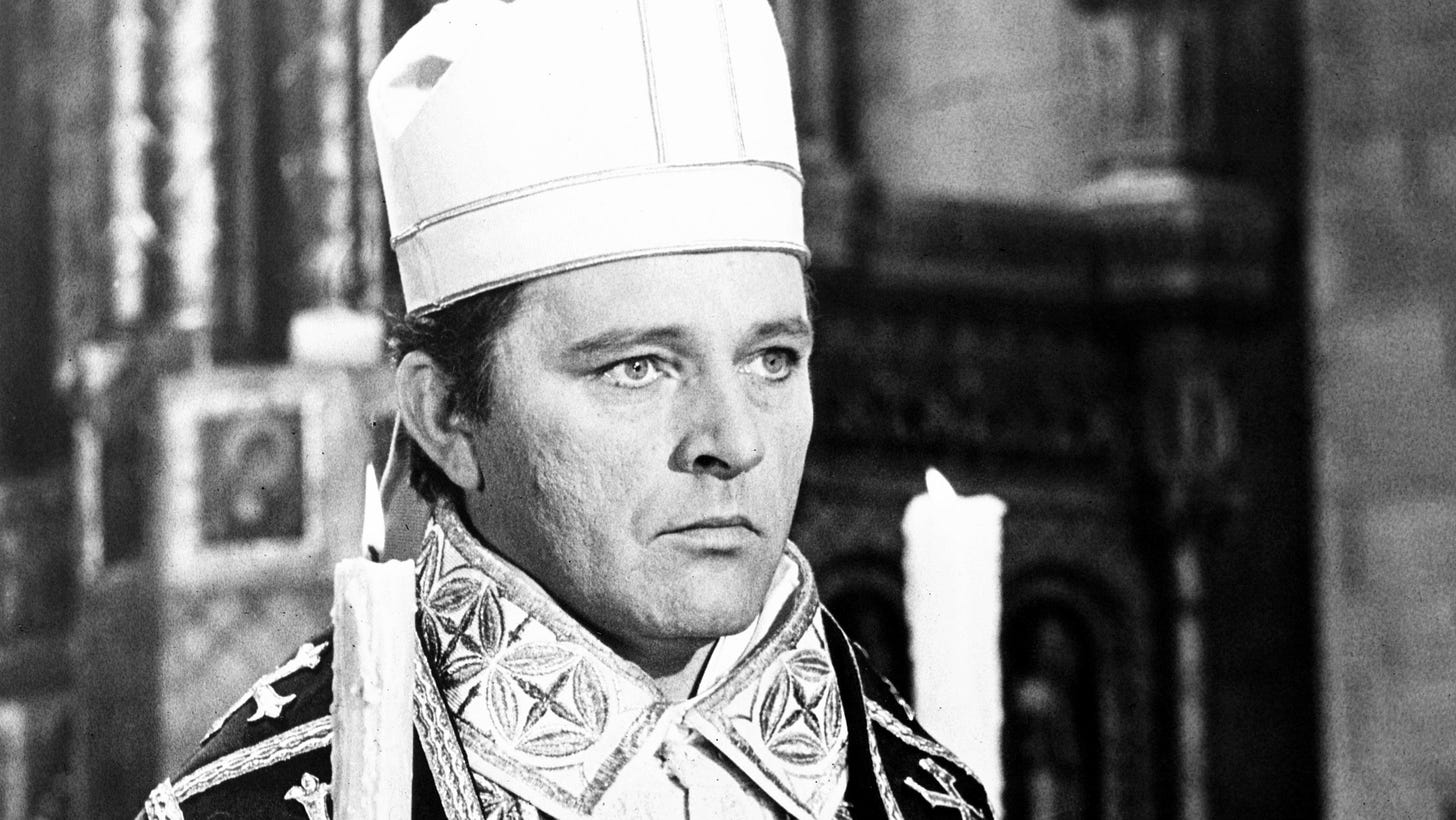
It is impossible to defend the liberty of the Church and the Kingship of Christ whilst simultaneously holding to the modern conception of religious liberty.
Editors’ Notes
In honour of the feast of St Thomas Becket of Canterbury, we are reproducing these reflections on his martyrdom for the liberty of the Church, as explained by Dom Prosper Guéranger.
Following Guéranger’s extract, I will explain how these great truths about the liberty of the Church are fundamentally denied by the concept of “religious liberty,” which has itself been condemned on multiple occasions by the popes and great Catholic authorities.
In addition, it should be clear that the liberty of the Church explained by Guéranger is in many ways equivalent to what we today call “the social reign of Christ the King.”
But as we shall see—even from Guéranger alone—it is absolutely impossible to hold to the traditional and orthodox ideas about the liberty of the Church and the social Kingship of Christ, whilst simultaneously holding to the modern conception of the liberty of religions or religious liberty.
St Thomas Becket, Archbishop of Canterbury
Martyr for the Liberty of the Church—December 29
Dom Prosper Guéranger
The Liturgical Year: Christmastide Vol. I
James Duffy, London, 1868, 339-350.
A new martyr at the crib
Another Martyr comes in today to take his place round the Crib of our Jesus. He does not belong to the first ages of the church: his name is not written in the Books of the New Testament, like those of Stephen, John, and the Innocents of Bethlehem.
Yet does he stand most prominent in the ranks of that Martyr-Host, which has been receiving fresh recruits in every age, and is one of those visible abiding proofs of the vitality of the Church, and of the undecaying energy infused into her by her divine Founder.
This glorious Martyr did not shed his blood for the faith; he was not dragged before the tribunals of Pagans or Heretics, there to confess the Truths revealed by Christ and taught by the Church. He was slain by Christian hands; it was a Catholic King that condemned him to death; it was by the majority of his own Brethren, and they his countrymen, that he was abandoned and blamed.
How, then, could he be a Martyr? How did he gain a Palm like Stephen’s? He was the Martyr for the Liberty of the Church.
The universal duty to defend the Faith
Every Christian is obliged to lay down his life rather than deny any of the Articles of our holy Faith: it was the debt we contracted with Jesus Christ when he adopted us, in Baptism, as his Brethren.
All are not called to the honour of Martyrdom, that is, all are not required to bear that testimony to the Truth, which consists in shedding one’s blood for it: but all must so love their Faith as to be ready to die rather than deny it, under pain of incurring the eternal death from which the grace of our Redeemer has already delivered us.
The same obligation lies still more heavily on the Pastors of the Church. It is the pledge of the truth of their teachings. Hence we find, in almost every page of the History of the Church, the glorious names of saintly Bishops who laid down their lives for the Faith they had delivered to their people.
It was the last and dearest pledge they could give of their devotedness to the Vineyard entrusted to them, and in which they had spent years of care and toil. The blood of their Martyrdom was more than a fertilizing element—it was a guarantee, the highest that man can give, that the seed they had sown in the hearts of men was, in very truth, the revealed Word of God.
Pastors and the liberty of the Church
But beyond the debt which every Christian has of shedding his blood rather than deny his Faith, that is, of allowing no threats or dangers to make him disown the sacred ties which unite him to the Church, and, through her, to Jesus Christ—beyond this, Pastors have another debt to pay, which is that of defending the Liberty of the Church.
To Kings and Rulers and, in general, to all Diplomatists and Politicians, there are few expressions so unwelcome as this of the Liberty of the Church; with them, it means a sort of conspiracy. The world talks of it as being an unfortunate scandal, originating in priestly ambition. Timid temporising Catholics regret that it can elicit anyone’s zeal, and will endeavour to persuade us that we have no need to fear anything, so long as our Faith is not attacked.
Notwithstanding all this, the Church has put upon her altars and associated with St. Stephen, St. John, and the Holy Innocents, this our Archbishop, who was slain in his Cathedral of Canterbury, in the 12th century, because he resisted a King’s infringements on the extrinsic Rights of the Church. She sanctions the noble maxim of St. Anselm, one of St. Thomas’ predecessors in the See of Canterbury: Nothing does God love so much in this world, as the Liberty of his Church; and the Apostolic See declares by the mouth of Pius the 8th, in the 19th century, the very same doctrine she would have taught by St. Gregory the 7th, in the 11th century:
The Church, the spotless Spouse of Jesus Christ the immaculate Lamb is, by God’s appointment, Free, and subject to no earthly power.1
What is the liberty of the Church?
But in what does this sacred Liberty consist?
It consists in the Church’s absolute independence of every secular power…
In the ministry of the Word of God, which she is bound to preach in season and out of season, as St. Paul says, to all mankind, without distinction of nation, or race, or age, or sex
In the administration of the Sacraments, to which she must invite all men, without exception, in order to the world’s salvation
In the practice, free from all human control, of the Counsels, as well as of the Precepts, of the Gospel
In the unobstructed intercommunication of the several degrees of her sacred hierarchy
In the publication and application of her decrees and ordinances in matters of discipline
In the maintenance and development of the Institutions she has founded
In the holding and governing her temporal patrimony
And lastly, in the defense of those privileges which have been adjudged to her by the civil authority itself, in order that her ministry of peace and charity might be unembarrassed and respected.
Such is the Liberty of the Church. It is the bulwark of the Sanctuary. Every breach there imperils the Hierarchy, and even the very Faith.
A Bishop may not flee, as the hireling, nor hold his peace, like those of dumb dogs, of which the Prophet Isaias speaks, and which are not able to bark.2 He is the Watchman of Israel: he is a traitor if he first lets the enemy enter the citadel and then, but only then, gives the alarm and risks his person and his life.
The obligation of laying down his life for his flock begins to be in force at the enemy’s first attack upon the very outposts of the City, which is only safe when they are strongly guarded.
Martyrdom as the Church’s guarantee
The consequences of the Pastor’s resistance may be of the most serious nature; in which event, we must remember a truth, which has been admirably expressed by Bossuet, in his magnificent Panegyric on St. Thomas of Canterbury, which we regret not being able to give from beginning to end:
“It is an established law,” he says, “that every success the Church acquires costs her the life of some of her children, and that in order to secure her rights, she must shed her own blood. Her Divine Spouse redeemed her by the Blood he shed for her; and he wishes that she should purchase, on the same terms, the graces he bestows upon her.
“It was by the blood of the Martyrs that she extended her conquests far beyond the limits of the Roman Empire. It was her blood that procured her both the peace she enjoyed under the Christian, and the victory she gained over the Pagan, Emperors. So that, as she had to shed her blood for the propagation of her teaching, she had also to bleed for the making her authority accepted.
“The Discipline, therefore, as well as the Faith, of the Church, was to have its Martyrs.”
Hence it was that St. Thomas, and the rest of the Martyrs for Ecclesiastical Liberty, never once stopped to consider how it was possible, with such weak means as were at their disposal, to oppose the invaders of the rights of the Church.
One great element of Martyrdom is simplicity united with courage; and this explains how there have been Martyrs amongst the lowest classes of the Faithful, and that young girls, and even children, can show their rich Palm-branch. God has put into the heart of a Christian a capability of humble and inflexible resistance, which makes every opposition give way. What, then, must that fidelity be, which the Holy Ghost has put into the souls of Bishops, whom he has constituted the Spouses of his Church, and the defenders of his beloved Jerusalem?
“St. Thomas,” says Bossuet, “yields not to injustice, under the pretext that it is armed with the sword, and that it is a King who commits it; on the contrary, seeing that its source is high up, he feels his obligation of resisting it to be the greater, just as men throw the embankments higher when the torrent swells.”
The blood of martyrs and the Church’s strength
But the Pastor may lose his life in the contest! Yes, it may be so—he may possibly have this glorious privilege. Our Lord came into this world to fight against it and conquer it—but he shed his blood in the contest, he died on a Cross. So likewise were the Martyrs put to death.
Can the Church, then, that was founded by the Precious Blood of her Divine Master, and was established by the blood of the Martyrs—can she ever do without the saving laver of blood, which reanimates her with vigor, and vests her with the rich crimson of her royalty?
St. Thomas understood this: and when we remember how he labored to mortify his flesh by a life of penance, and how every sort of privation and adversity had taught him to crucify to this world every affection of his heart, we cannot be surprised at his possessing, within his soul, the qualities which fit a man for martyrdom—calmness of courage, and a patience proof against every trial. In other words, he had received from God the Spirit of Fortitude, and he faithfully corresponded to it.
“In the language of the Church,” continues Bossuet, “Fortitude has not the meaning it has in the language of the world. Fortitude, as the world understands it, is the undertaking great things; according to the Church, it goes not beyond the suffering every sort of trial, and there it stops.
“Listen to the words of St. Paul: Ye have not yet resisted unto blood; as though he would say: ‘You have not resisted your enemies unto blood.’ He does not say, ‘You have not attacked your enemies and shed their blood;’ but, ‘Your resistance to your enemies has not yet cost you your blood.’
“These are the high principles of St. Thomas; but see how he makes use of them. He arms himself with this sword of the Apostle’s teaching, not to make a parade of courage, and gain a name for heroism, but simply because the Church is threatened, and he must hold over her the shield of his resistance.
“The strength of the holy Archbishop lies not, in any way, either in the interference of sympathizers, or in a plot ably conducted. He has but to publish the sufferings he has to patiently borne, and odium will fall upon his persecutor: certain secret springs need only to be touched by such a man as this, and the people would be roused to indignation against the King! but the Saint scorns both plans.
“All he has on his side is the prayer of the poor, and the sighs of the widow and the orphan: these, as St. Ambrose would say, these are the Bishop’s defenders, these his guard, these his army! He is powerful, because he has a soul that knows not either how to fear or how to murmur. He can, in all truth, say to Henry, King of England, what Tertullian said, in the name of the whole Church, to a magistrate of the Roman Empire, who was a cruel persecutor of the Church: We neither frighten thee, nor fear thee:3 we Christians are neither dangerous men, nor cowards; not dangerous, because we cannot cabal, and not coward, because we fear not the sword.”
A sacrifice for the Church’s liberty
Our Panegyrist proceeds to describe the victory won for the Church by her intrepid Martyr of Canterbury. We can scarcely be surprised when we are told that during the very year in which he preached this eloquent Sermon, Bossuet was raised to the episcopal dignity. We need offer no apology for giving the following fine passage.
“Christians! give me your attention. If there ever were a Martyrdom which bore the resemblance to a Sacrifice, it was the one I have to describe to you. First of all, there is the preparation: the Bishop is in the Church with his Ministers, and all are robed in the sacred Vestments.
“And the Victim? The Victim is near at hand—the Bishop is the Victim chosen by God, and he is ready. So that all is prepared for the Sacrifice, and they that are to strike the blow enter the Church.
“The holy man walks before them, as Jesus did before his enemies. He forbids his Clergy to make the slightest resistance, and all he asks of his enemies is that they injure none of them that are present: it is the close imitation of his Divine Master, who said to them that apprehended them: If it be I whom ye seek, suffer these to go their way.
“And when all this had been done, and the moment for the sacrifice was come, St. Thomas begins the ceremony. He is both Victim and Priest—he bows down his head, and offers the prayer. Listen to the solemn prayer, and the mystical words, of the sacrifice:
And I am ready to die for God, and for the claims of justice, and for the Liberty of the Church, if only she may gain peace and Liberty by this shedding of my blood!4
“He prostrates himself before God: and as in the Holy Sacrifice there is the invocation of the Saints our Intercessors, Thomas omits not so important a ceremony; he beseeches the Holy Martyrs and the Blessed Mary ever a Virgin to deliver the Church from oppression.
“He can pray for nothing but the Church; his heart beats but for the Church; his lips can speak nothing but the Church; and when the blow has been struck, his cold and lifeless tongue seems still to be saying: The Church!”
The fruits of his martyrdom
Thus did our glorious Martyr, the type of a Bishop of the Church, consummate his sacrifice, thus did he gain his victory; and his victory will produce the total abolition of the sinful laws which would have made the Church the creature of the State, and an object of contempt to the people.
The tomb of the Saint will become an Altar; and at the foot of that Altar there will one day kneel a penitent King, humbly praying for pardon and blessing. What has wrought this change? Has the death of Thomas of Canterbury stirred up the people to revolt? Has his Martyrdom found its avengers?
No. It is the blood of one, who died for Christ, producing its fruit. The world is hard to teach, else it would have long since learned this truth—that a Christian people can never see with indifference a Pastor put to death for fidelity to his charge; and that a Government that dares to make a Martyr will pay dearly for the crime.
Modern diplomacy has learned the secret; experience has given it the instinctive craft of waging war against the Liberty of the Church with less violence and more intrigue—the intrigue of enslaving her by political administration. It was this crafty diplomacy which forged the chains wherewith so many Churches are now shackled, and which, be they ever so gilded, are insupportable.
There is but one way to unlink such fetters—to break them. He that breaks them will be great in the Church of heaven and earth, for he must be a Martyr: he will not have to fight with the sword, or be a political agitator, but simply, to resist the plotters against the Liberty of the Spouse of Christ, and suffer patiently whatever may be said or done against him.
The power of the Church in weakness
Let us give ear once more to the sublime Panegyrist of our St. Thomas: he is alluding to this patient resistance, which made the Archbishop triumph over tyranny.
“My Brethren, see what manner of men the Church finds rising up to defend her in her weakness, and how truly she may say with the Apostle: When I am weak, then am I powerful.5 It is this blessed weakness which provides her with invincible power, and which enlists in her cause the bravest soldiers and the mightiest conquerors this world has ever seen—I mean, the Martyrs.
“He that infringes on the authority of the Church, let him dread that precious blood of the Martyrs, which consecrates and protects it.”
Strength drawn from the crib
Now, all this Fortitude, and the whole of this Victory, come from the Crib of the Infant Jesus: therefore it is that we find St. Thomas standing near it, in company with the Protomartyr Stephen.
Any example of humility, and of what the world calls poverty and weakness, which had been less eloquent than this of the mystery of God made a Little Child, would have been insufficient to teach man what real Power is.
Up to that time, man had no other idea of power than that which the sword can give, or of greatness than that which comes of riches, or of joy than such as triumph brings: but when God came into this world and showed himself weak and poor and persecuted—everything was changed.
Men were found who loved the lowly Crib of Jesus, with all its humiliations, better than the whole world besides: and from this mystery of the weakness of an Infant God they imbibed a greatness of soul which even the world could not help admiring.
The legacy of St. Thomas’ martyrdom
It is most just, therefore, that the two laurel-wreaths of St. Thomas and St. Stephen should intertwine round the Crib of the Babe of Bethlehem, for they are the two trophies of his two dear Martyrs.
As regards St. Thomas, divine Providence marked out most clearly the place he was to occupy in the Cycle of the Christian Year by permitting his martyrdom to happen on the day following the Feast of the Holy Innocents; so that the Church could have no hesitation in assigning the 29th of December as the day for celebrating the memory of the saintly Archbishop of Canterbury.
As long as the world lasts, this day will be a Feast of dearest interest to the whole Church of God; and the name of Thomas of Canterbury will be, to the day of judgment, terrible to the enemies of the Liberty of the Church, and music breathing hope and consolation to hearts that love that Liberty, which Jesus bought at the price of his Precious Blood.
The account given by the Divine Office
We will now listen to this dear Mother of ours, the Church, who gives us, in her Divine Office, a short history of the life and sufferings of St. Thomas.
“Thomas was born in England, in the city of London. He succeeded Theobald as Bishop of Canterbury. He had previously acquitted himself with much honor as Chancellor, and was strenuous and unflinching in his duty as Bishop; for when Henry 2nd, King of England, in an assembly of the Bishops and Nobles of the realm, passed certain laws inconsistent with the interests and the honor of the Church, the Bishop withstood the King’s avarice so courageously, that neither fair promises nor threats could draw him over to the King’s side, and, being in danger of imprisonment, he privately withdrew.
“Not long after, all his relatives young and old, all his friends, and household, were banished, and such of them, as had attained the age of discretion, were made to promise on oath that they would go to Thomas, as perhaps he, who could not be made to swerve from his holy purpose, by any personal consideration, might relent at the heart-rending spectacle of the sufferings of them who were dear to him.
“But he regarded not the demands of flesh and blood, neither did he permit the feelings of natural affection to weaken the firmness required of him as Bishop.
“He, therefore, repaired to Pope Alexander 3rd, from whom he met with a kind reception, and who commended him, on his departure, to the Cistercian Monks of Pontigny. As soon as Henry came to know this, he strove to have Thomas expelled from Pontigny, and, for this purpose, sent threatening letters to the General Chapter of Citeaux.
“Whereupon, the holy man, fearing lest the Cistercian Order should be made to suffer on his account, left the Monastery of his own accord, and betook himself to the hospitable shelter to which he had been invited by Louis, King of France. There he remained, until, by the intervention of the Pope and Louis the King, he was called home from his banishment, to the joy of the whole kingdom.
“While resuming the intrepid discharge of the duty of a good Shepherd, certain calumniators denounced him to King Henry as one that was plotting sundry things against the country and the public peace. Wherefore, the King was heard frequently complaining, that there was only one Priest in his kingdom with whom he could not be in peace.
“Certain wicked satellites excluded from this expression of the King, that he would be pleased at their ridding him of Thomas. Accordingly, they stealthily enter Canterbury, and finding the Bishop was in the Church, officiating at Vespers, they began their attack.
“The Clergy were using means to prevent them from entering the Church, when the Saint, coming to them, forbade their opposition, and, opening the door, thus spoke to them: The Church is not to be guarded like a citadel, and I am glad to die for God’s Church. Then turning to the soldiers, he said: I command you, in the name of God, that you hurt not any of them that are with me.
“After this, he knelt down, and commending his Church and himself to God, to the Blessed Mary, to St. Denis, and to the other Patron Saints of his Cathedral, with the same courage that he had shown in resisting the King’s execrable laws, he bowed down his head to the impious murderers, on the Fourth of the Calends of January (December 29th), in the Year of our Lord 1171.
“His brains were scattered on the floor of the entire Church. God having shown the holiness of his servant by many miracles, he was canonized by the same Pope, Alexander III.”
From The Catholic Encyclopaedia
An immense number of miracles were worked, and for the rest of the Middle Ages the shrine of St. Thomas of Canterbury was one of the wealthiest and most famous in Europe.
The martyr's holy remains are believed to have been destroyed in September, 1538, when nearly all the other shrines in England were dismantled; but the matter is by no means clear, and, although the weight of learned opinion is adverse, there are still those who believe that a skeleton found in the crypt in January, 1888, is the body of St. Thomas.6
Collect
O God, in defence of whose Church the glorious Pontiff Thomas fell by the swords of wicked men: grant, we beseech thee, that all who implore his assistance, may find comfort in the grant of their petition.
From Dom Prosper Guéranger’s The Liturgical Year.



